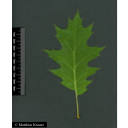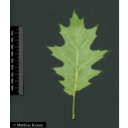Useful information about the taxon (species, subspecies, variety...)
Quercus ellipsoidalis E. J. Hill 1899
Fagaceae
(APG IV)Northern pin oak
Akzessionnummer: EG-B-193-18219
Pflanzjahr: 2017
Taxon concept: The Plant List (2014), version 1.1
Distribution: Northeastern North America
Quercus ellipsoidalis E. J. Hill - Accepted: Quercus ellipsoidalis E. J. Hill bei The Plant List (2014), version 1.1; Familie: Fagaceae (APG III)
- Difference to related species
- in contrast to closely related oak species as Quercus coccinea, the trunk bears remnants of dead branches ("pins")
- Life form
- tree
- Leaves
- upper surface bright green, lustrous, glabrous; lower surface paler green, moderately lustrous, glabrous or with small tufts of hairs in the axils of main veins; petiole 2-5 cm long
- Foliage persistence
- deciduous
- Fruits
- acorn with cupule; dark brown and 10-20 mm long, sometimes with vertical stripes
- Fruit ecology
- animal-dispersed (zoochorous) (squirrels, birds)
- Natural occurrence (habitat)
- dry, sandy, fire-prone uplands, occasionally in moist woodlands along streams and ponds
- Vegetation typ and synecology (plant community)
- pine-oak communities
- Constraints according moisture
- extremely drought-tolerant
- Bark
- dark greyish brown
- Altidudinal lower limit (sea level in m)
- 150
- Altitudinal higher limit (sea level in m)
- 500
The International Plant Names Index (2009). Published on the Internet http://www.ipni.org; Courtesy to IPNI, 2009. Exported from IPNI at date: 2009-09-22 20:17:51; The IUCN Red List of Threatened Species. www.iucnredlist.org;
Diese Webseite verwendet Google Maps, um Karten und Standorte von Pflanzen in den Hohenheimer Gärten anzuzeigen. Dadurch werden unter Umständen Daten an Google weitergeleitet, was mit einer Verarbeitung Ihrer personenbezogenen Daten verbunden sein kann. Die Datenschutzerklärung von Google finden Sie hier: Datenschutzerklärung von Google


